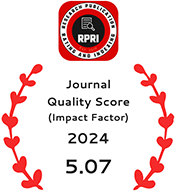A Descriptive Look at the Factors Influencing the Geopolitics of Afghanistan
The Geopolitics of Afghanistan
DOI:
https://doi.org/10.55544/jrasb.2.2.26Keywords:
Geographical location, Topographic status, Geopolitics, AfghanistanAbstract
Geopolitics means the effect of the geographical location of the region on the policies of other governments. Afghanistan, as a landlocked country, is a strategic geographical area because of its neighbors, and in principle, a country with a strategic position is inevitably part of the military strategy. Afghanistan also has this potential, so Afghanistan's geopolitical attractions have attracted the attention of superpowers from the past to the present. Understanding geopolitical codes is one of the factors that politicians of any government should try to identify to use the appropriate strategy to establish a strong diplomatic relationship with other countries.
Downloads
Metrics
References
Attaat, Javad. (1997). Geopolitics and Foreign Policy of Iran. Tehran, Safir Publications.
Amiri, Ali Doust. (2004). Introduction to Afghanistan Geopolitics. Bi JA.
Rahimi, Sardar Mohammad. (2017). Afghanistan's geopolitics in the twentieth century; Developments, approaches, consequences. Kabul: Word Publishing.
Arez, Ghulam Jelani. (2003). Boundaries and administrative divisions of Afghanistan throughout history. Kabul, Publications: Maiwand.
Ezati, Ezatullah. (2001). Geopolitics in the 21st Century. Tehran, Samat Publications.
Azimi, Mohammad Azim. (2003). Geography of Afghanistan. Mashhad, Saeed Printing House.
Guilford, Mary Lewis. (1989. The land and people of Afghanistan. Translation, Khosrow Asadi, Tehran, Rasa Cultural Services Institute.
Mojtahedzadeh, Pirooz. (2002). Political Geography and Geographical Politics. Tehran, Samat Publications.
Elahi, Homayoun. (2005). Persian Gulf and its issues. Tehran, Qoms.
Loro, Pascal; tawal. François. (2002). Geopolitical Keys. Translation: Hassan Saduq. Tehran: Shahid Beheshti University Press.
Valdani, Asghar. (2009). Challenges and Conflicts in the Middle East. Tehran, Research Institute of Strategic Studies, p. 28.
Downloads
Published
How to Cite
Issue
Section
License
Copyright (c) 2023 Ziaulhaq Amiri, Sharifullah Habibyar

This work is licensed under a Creative Commons Attribution-NonCommercial-NoDerivatives 4.0 International License.


















